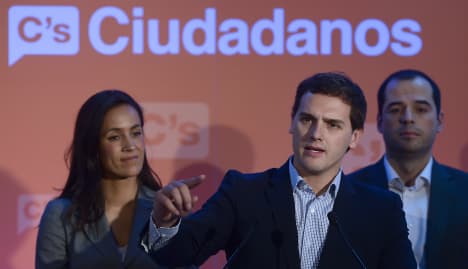'C's and Podemos belong to same change'

Albert Rivera has argued that his centrist party belongs to "the same change" as Podemos but offers different solutions as competition between the two newcomers hots up.
The latest polls have confirmed that Spain's old two-party system is dead; there are now four parties jostling neck and neck in the run up to May’s local elections and the general election at the end of the year.
And while left-wing party Podemos, which grew out of the Indignados movement, has stagnated in the polls, centrist party Ciudadanos is going from strength to strength, offering a less radical option for voters who still want to see a shakeup of the traditional Spanish political system.
Often positioned as fierce opponents, Rivera denied the rivalry between the two parties in an interview in Madrid on Tuesday with news agency Bloomberg, saying that both Ciudadanos and Podemos were part of the change; it was up to voters to decide who they wanted to lead the country.
"I’m not really sure that we are a rival of Podemos, I think that in Spain there is a change, a new stage in our politics, and Ciudadanos belong to the same change in Spain," he said, proving that unlike the current Prime Minister, he has a good command of English.
"We defend that some things are wrong and normally we offer different solutions to Podemos but I’m not sure that Ciudadanos and Podemos don’t belong to the same change."
According to the latest polls, published in Spanish daily El País in April, Ciudadanos is firmly positioned as Spain’s fourth party, with 19.4 percent, while Podemos is leading the pack, on 22.1 percent (down 1.4 percent on a similar poll conducted in March).
The party was established in 2006 in Catalonia to counter the nationalism sweeping the north eastern region and launched nationwide this year, promising to fight corruption, overhaul the Spanish education system and roll out a series of economic changes, if elected.
Ciudadnos have faced criticism of being a right-wing party, more in line with the ruling Popular Party than the middle ground they court, but Rivera was clear on the differences between Ciudadanos and the PP:
"We are a younger party which represents a new generation of people in Spain, people who have lived in a democratic time.
"We are not a party from the transition in Spain, we are a new party," he added, referring to the links that remain between the Popular Party and the transition, when Spain changed almost overnight from dictatorship to democracy.
He said that Ciudadanos is growing, with more and more people signing up to the party, which today has ten times more funding from subscriptions than four years ago.
"I think in Spain people want a change and why not?" he said.
"If Pablo Iglesias could lead Spain, why not Ciudadanos?"
Comments
See Also
The latest polls have confirmed that Spain's old two-party system is dead; there are now four parties jostling neck and neck in the run up to May’s local elections and the general election at the end of the year.
And while left-wing party Podemos, which grew out of the Indignados movement, has stagnated in the polls, centrist party Ciudadanos is going from strength to strength, offering a less radical option for voters who still want to see a shakeup of the traditional Spanish political system.
Often positioned as fierce opponents, Rivera denied the rivalry between the two parties in an interview in Madrid on Tuesday with news agency Bloomberg, saying that both Ciudadanos and Podemos were part of the change; it was up to voters to decide who they wanted to lead the country.
"I’m not really sure that we are a rival of Podemos, I think that in Spain there is a change, a new stage in our politics, and Ciudadanos belong to the same change in Spain," he said, proving that unlike the current Prime Minister, he has a good command of English.
"We defend that some things are wrong and normally we offer different solutions to Podemos but I’m not sure that Ciudadanos and Podemos don’t belong to the same change."
According to the latest polls, published in Spanish daily El País in April, Ciudadanos is firmly positioned as Spain’s fourth party, with 19.4 percent, while Podemos is leading the pack, on 22.1 percent (down 1.4 percent on a similar poll conducted in March).
The party was established in 2006 in Catalonia to counter the nationalism sweeping the north eastern region and launched nationwide this year, promising to fight corruption, overhaul the Spanish education system and roll out a series of economic changes, if elected.
Ciudadnos have faced criticism of being a right-wing party, more in line with the ruling Popular Party than the middle ground they court, but Rivera was clear on the differences between Ciudadanos and the PP:
"We are a younger party which represents a new generation of people in Spain, people who have lived in a democratic time.
"We are not a party from the transition in Spain, we are a new party," he added, referring to the links that remain between the Popular Party and the transition, when Spain changed almost overnight from dictatorship to democracy.
He said that Ciudadanos is growing, with more and more people signing up to the party, which today has ten times more funding from subscriptions than four years ago.
"I think in Spain people want a change and why not?" he said.
"If Pablo Iglesias could lead Spain, why not Ciudadanos?"
Join the conversation in our comments section below. Share your own views and experience and if you have a question or suggestion for our journalists then email us at [email protected].
Please keep comments civil, constructive and on topic – and make sure to read our terms of use before getting involved.
Please log in here to leave a comment.